
This is what a European looks like
08.02.2016
Mark Perryman of Philosophy Football makes a populist case for Europe
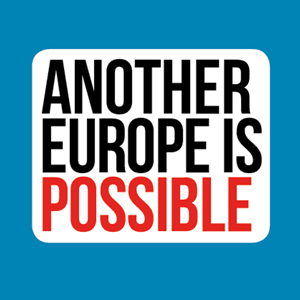 When I ask the question more often than not I am greeted with a sea of blank faces. ‘What’s the most Europeanised institution in British society?’ Easy! Easy! One-nil to me. Are we getting warm yet? Yes, a football club. From the owners and major shareholders, the management and coaching staff , via players on the pitch, youthful prospects training in the clubs’ academies, the competitions the clubs aspire to be part of, the shirt sponsors and pitchside advertising, the fans in the stands, the TV and wider media audience.
When I ask the question more often than not I am greeted with a sea of blank faces. ‘What’s the most Europeanised institution in British society?’ Easy! Easy! One-nil to me. Are we getting warm yet? Yes, a football club. From the owners and major shareholders, the management and coaching staff , via players on the pitch, youthful prospects training in the clubs’ academies, the competitions the clubs aspire to be part of, the shirt sponsors and pitchside advertising, the fans in the stands, the TV and wider media audience.
To win the debate on Europe, not that there’s much evidence of anything resembling a debate just yet, we need to entirely reinvent the terms of it. Football is as good a place to start that vital, and urgent, process as any other. Europeanisation of British football isn’t all good, of course. Foreign owners at the expense of supporter ownership. Domestic talent not getting a look in because overseas players and managers are too readily preferred. Global TV rights sold amounting to billions of pounds but ticket prices just keep going up, and up, and up. All of this is true but precious few fans would want to disconnect their football from Europe, and most would celebrate a decent proportion of the consequences of our national game going European as positives. OK it helps if you’re winning. When Newcastle supporters were basking in the success of their team’s French imports restoring the club to winning ways they famously renamed their favourite pre-match drinking hole The Strawberry, La Fraiche. Once the decline and fall returned it became all about those same French imports not having the stomach for a relegation scrap that true-born Geordies would have.
But look again at the bigger picture. Think how Cantona, Ronaldo, Vieira and Henry, Klinsmann and Zola have transformed English football, for the better, on the pitch. Wenger, Koeman, Martinez, in the technical area have immeasurably improved how the top-flight game is played. Who in Leicester this season would resent the fact that it is an Italian, Ranieri, in charge rather than their former manager, Englishman Nigel Pearson?
What can be said of football can to a large extent be said of the food we eat, the beer and wine that we drink, the fashion labels we dress ourselves in, the music we listen and dance to, the films and TV programmes we watch, the places we holiday in. British culture is increasingly Europeanised and most, if not all, are more than happy that it is. This is a popular internationalism, not of the solidarity with this, boycott that activist variety but every bit as, if not more, important. The question we should be asking is ‘What has Europe ever done for us?’ Plenty. And to those who retort, two world wars that’s what, it is Europe that both defeated the causes of both and since ‘45 has created the conditions to prevent a third one thankyou very much.
There is of course the issue of immigration, but in almost every instance this is raised there is next to no mention of emigration. Europe is a continent of job, education and lifestyle opportunities. To return to football as our conversation-starter. Instead of worrying so much about all those gifted foreign players wanting to come and play here we should be asking why so few of our players want to play abroad? The millennial generation will increasingly see Europe as their workplace, the place to study and train, a cultural common ground. Who are we to deny them that opportunity? Or is the Europe of the future only to be for those who can afford a French second home or a Spanish property to retire to?
What the in/out debate desperately needs is a popular vision of the Europe we want to become. A continent we are part of, not apart from. Britain as a European state like the rest of them not a so-called island race that patently ignores its history as a mongrel nation. Ironic really when 2016 marks the 950th anniversary of the Battle of Hastings and the Norman Conquest. And of course this is an island too that is on the verge of its own breakdown too. ‘Who shall speak for England’ the Daily Mail asks while on its back page the sportswriters regale the readers ahead of rugby’s Six Nations with how much they hate the Scots, and vice versa. What was once only true on the pitch is now absolutely the case off it. Not the fired-up rivalry in the stands but a political division as the dawning realisation that Scotland and England are two separate nations takes root in the body politic. And once Scotland breaks away, as in every meaningful sense it already has, Britain no longer exists. ‘Who shall speak for England?’ Whoever decided that Englishness is somehow the most anti-European of the lot is as out of touch with English popular culture as only a campaign led by an octogenarian, failed Chancellor of the Exchequer climate-change denier could be. Perhaps he should ask his daughter from whiuch countries she gets all those tasty and best-selling recipes for pasta, paella, moussaka and coq au vin from?
Cosmopolitanism is what this debate is all about. To change all that is wrong with the institutions post-war Europe created we have to be in it. Only the cowardly walk away. Lawson, Nigel not Nigella, and their ilk want the kind of uncomplicated Britain that existed before the Beatles played Hamburg and changed the world, Celtic and Man Utd won the European Cup , the corner fish and chips shop were overtaken by home-delivery pizza joints and the mini was built and manufactured somewhere or other but certainly not here. Have France, Italy, Spain, Germany surrendered their culture, their language, their history at the expense of being European? Of course not. And neither have, or will, we. Do the Dutch and the Germans, the Spanish and Portuguese retain their differences via their rivalry. Absolutely, as no doubt we will continue to do so with France and just about everyone else the other side of the Channel. And do parties including Syriza, Podemos, Left Bloc, Die Linke campaign to change Europe for the better? Yes and so should the English, Scots, Welsh left too, as constituent parties of a wider European Left of great variety.
Our side is popular and cosmopolitan, modern and European. The other lot narrow and inward-looking, out of touch and ancient, stop the world the want to get off and can’t wind the clock back quick enough. Ours are values rooted in the present but with an eye and purpose on a better, European, future. We cannot rely on the referendum debate being framed in these terms. NigelsLawson and Farage vs Alan Johnson and Nick Clegg, these are yesterday’s men. One line-up of business leaders vs theirs reducing the argument to number crunching that few have very much faith in. Editors providing the anti-or pro case in papers that are read by fewer and fewer, trusted by less and less. For values and visions that matter we’ll have to look elsewhere, a Europe from below, together as Europeans of many different nations. Not out, but in to shake it all about. To the foundations if you don’t mind. Our single European currency a faceless institution or a banknote in our pocket. Don’t make me laugh. It’s a culture, for me its my football for others something else and we’re not giving it up for nobody. This is what a European looks like.
Philosophy Football’sAnother Europe is Possible campaign T-shirt is now available just £9.99 from here
'Don't Tell Him Pike!'
01.02.2016
Mark Perryman of Philosophy Football describes Dad’s Army as the most popular front of all
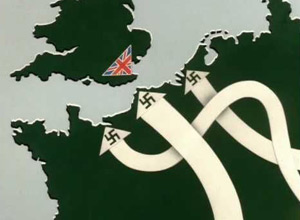 1968 was a tumultuous year. The Tet Offensive, the civil rights movement, the May events of ‘Paris, London, Rome, Berlin, We shall fight, we will win’ and the Prague Spring. This was also the year, 15th April to be precise, that Dad’s Army, unarguably Britain’s most loved TV comedy series, was broadcast for the very first time. Quite remarkably almost fifty years on never-ending repeats from the nine original series are still being broadcast as primetime Saturday night TV. Over Christmas a drama-documentary closely based on fact We’re Doomed : The Dad’s Army Story appeared on BBC, again in prime-time. And perhaps most amazing of all Dad’s Army has been remade into a new feature film, not reinvented for a 2016 audience but recreated to be as close as possible to the original version.
1968 was a tumultuous year. The Tet Offensive, the civil rights movement, the May events of ‘Paris, London, Rome, Berlin, We shall fight, we will win’ and the Prague Spring. This was also the year, 15th April to be precise, that Dad’s Army, unarguably Britain’s most loved TV comedy series, was broadcast for the very first time. Quite remarkably almost fifty years on never-ending repeats from the nine original series are still being broadcast as primetime Saturday night TV. Over Christmas a drama-documentary closely based on fact We’re Doomed : The Dad’s Army Story appeared on BBC, again in prime-time. And perhaps most amazing of all Dad’s Army has been remade into a new feature film, not reinvented for a 2016 audience but recreated to be as close as possible to the original version.
That very first appearance of the Walmington-on-Sea volunteers featured Jones the butcher sabotaging any threat of a Nazi invasion by reversing the road signs ‘To the town’ and ‘To the sea’ . Of course the result was obvious, a local motorcyclist stops, takes now the wrong turning and off camera there is a loud splash. A comedy classic has begun. It is easy to mock but a decisive connection is made via Dad’s Army with the Popular Front against Nazism which is ever-present amongst all the English slapstick humour. The Bank Manager, his hard-pressed Chief Cashier and the most junior of junior cashiers, the butcher, the miserabilist undertakerwho is an English coastline economic migrant from Scotland, the pensioner, the local ducker and diver, the vicar, the verger and their precious Church Hall, the busybody greengrocer. What brought them all together? The defence of Britain and all it meant to them from all that they feared Nazi rule would do in the name of hate. Only a few years previously Oswald Mosley and his British Union of Fascists was being cheered on by the Daily Mail ‘Hurrah for the Blackshirts’. Despite the best efforts of the stalwarts of Cable Street even in the autumn of 1939 after the declaration of war Mosley was still able to attract crowds to his so-called ‘peace rallies’ numbering in their thousands. The mood of appeasement remained ever-present spearheaded by the Tories’ Foreign Secretary, Lord Halifax. The middle-class , and very English, pomposity of Captain Mainwaring of 1940 is too easily confused with the nasty populism of UKiP 2016 but this is to seriously misunderstand and misrepresent what Walmington-on-Sea’s finest were all about. These were ordinary men (women, apart from Mrs Pike and Mrs Fox are almost entirely absent) doing extraordinary things and in the course of this reinventing what Britain could become. The selfless sacrifice of Mainwaring’s volunteers in the face of a Nazi Blitzkrieg that to date had laid waste to all resistance in its path is remarkable. In 1941 Hitler would launch Operation Barbarossa and do the same to any resistance in his way on the Eastern Front, until Stalingrad started the turning of the tide of course. The sacrifice is obvious in every episode, the heroism perhaps less so, although when a washed up U-Boat Commander tries to take over their seaside town Mainwaring’s epic order after the Nazi demands his young private’s name ‘Don’t Tell him Pike’ creates perhaps the show’s funniest moment of all. Never mind, the fierce and heroic resistance is obvious in Mainwaring’s voice and puffed up chest, no fascist was going to push old blighty around.
Of course class divisions remain within the platoon, as they did right across the war effort. But it is the public-school educated Sergeant Wilson who invariably loses out in the battle of will and leadership to the grammar-school educated Captain Mainwaring. It is however on the ideological front that in the fictionalised Walmington-on-Sea and the real Britain of 1939-45 a battle of ideas was being fought, and won. A popular mood of co-operation, the common anti-fascist cause and a wide recognition that a society led by and benefitting solely those most used to being in charge was no way to win either the war, or the peace. All of this created the basis for Labour’s 1945 landslide including the election of two Communist Party MPs, and the electoral defeat of Churchill’s Tory Party. We’ll never know whether the Walmington-on-Sea constituency went Labour, countless similar seats certainly did, but we can be sure that for at least a time the town wasn’t the place it was pre-1939.
There is a danger in dismissing the cult of nostalgia that Dad’s Army represented both in 1968 and in today’s version that we lose the meaning of that moment. Mainwaring, Wilson, Jones, Frazer, Godfrey, Pike & Walker were in their own way the most popular Popular Front of them all. Harking back to World War Two has created a peculiar version of English patriotism. The politics of anti-fascism are airbrushed out. The Labour victory in ‘45 despite Churchill’s wartime leadership scarcely mentioned. The Battle of Britain reduced to a football chant ‘Ten German Bombers and the RAF from England shot them down’ what kind of ill-informed tribute is that? World War Two memorialising becomes translated into a petty anti-Europeanism framed by a resentment at France ,and particularly Germany, but not Britain being the dominant forces in European politics. Dad’s Army gives us an alternative framework of understanding Britain then, and now. Unlike that other long-running BBC comedy set in World War Two Allo Allo the Germans rarely make an appearance and thus their fascism is never trivialised or turned into a misjudged excuse for a laugh. Mainwaring’s platoon are hopelessly funny but they are a joke. The opening credits spelt out what was at stake in 1940, Britain versus the swastika making its mark across Europe. This was an anti-nazi war not England vs Germany of ’66 vintage and ever since.
Dad’s Army was broadcast for 9 years, 1968-1977. Its ending pre-dates the rise and triumph of Thatcherism. It was under Maggie that Europhobia, or more accurately Germanophobia, came to define the Tory Right and would eventually create the basis for UKiP’s growth too. Given UKiP’s heartland support lies in England’s left behind coastal towns it is too easy to rewrite Walmington-on-Sea’s Mainwaring as Thatcher, or Farage, incarnate. But no, rather this was a platoon of community, common cause and if called-upon no little courage. You have been watching? The people vs fascism.
Philosophy Football’s 2016 range of Dad’s Army T-shirts are available from www.philosophyfootball.com
We can be Heroes
23.01.2016
Remember David Bowie but Mark Perryman of Philosophy Football argues with a purpose
 A cultural icon passes away and the routine of acres of newsprint, pullout supplements and memorial keepsakes follow in a mediated moment. What was it that Marx once said ‘All that is solid melts into air, all that is holy is profaned. The commodification of grief and loss creates a spectacle that amounts to wrenching the artist’s work out of any meaningful context their purpose denied the meaning that they intended. When David Cameron feels the need to share tales of surreptitiously listening to Bowie under the bedclothes of his Eton dormitory, the end of history surely beckons.
A cultural icon passes away and the routine of acres of newsprint, pullout supplements and memorial keepsakes follow in a mediated moment. What was it that Marx once said ‘All that is solid melts into air, all that is holy is profaned. The commodification of grief and loss creates a spectacle that amounts to wrenching the artist’s work out of any meaningful context their purpose denied the meaning that they intended. When David Cameron feels the need to share tales of surreptitiously listening to Bowie under the bedclothes of his Eton dormitory, the end of history surely beckons.
When Bowie sang that we could all be heroes, ‘we can be us’ just for one day he was celebrating a fundamental challenge to models of masculinity, gender and sexuality. The ever-changing Bowie was the most public of alternatives to rock music’s traditionally 1970’s macho culture, a popular internationalist equally at home in London, Berlin and New York, appreciative and understanding of each of these cities’ cultures and histories. He made us feel part of his world, not apart from it. Amateurishly daubing our own lightning flash across our faces, dyeing our hair and cutting it into a soulboy, or soulgirl, wedgecut, scouring the second-hand clothes shops to keep up with Bowie’s ransacking of fashion’s histories for his the latest change in how he looked and dressed.
Yes he had his off-moments. None more so when like too many artists he flirted with nazi-chic. It was a mistake that led directly to one of the most significant fusions of popular culture and protest in modern times , Rock against Racism. Bowie found himself on the wrong side of the argument but it was never where he belonged and he soon enough realised that.
Writer and cultural critic Suzanne Moore was one of the few mainstream commentators to sum up what Bowie at his best meant : “ That door. He unlocked it. For me, for you. For us. He gave us everything. He gave us ideas, ideas above our station. All the ideas and a specific one. Of life. The stellar idea that we can create ourselves whoever we are. He let us be more than we ever knew possible. There is nothing greater.”
There is a danger of course that this process of self-discovery results simply in an individualistic narcissism for adolescents, this is what pop culture back in Bowie’s peak years was founded on after all. The pin up poster on the bedroom wall, the fandom scrawled on the cover of a school exercise book, the latest release on the hi-fi . But to dismiss this and the resultant, for some, politics of identity as disconnected from social movements of change would be a profound misunderstanding .It was via these movements of feminism, gay liberation, black pride in the late twentieth century that politics was transformed to the evident discomfort of some pre-existing models of political change. Bowie represented a politics of identity that finds individual expression via committing personal acts of rebellion but most of those who were influence via his music to engage with their identity never lost sight of the the need for collective change too. If racism, sexism and homophobia are to be truly challenged then it it’s we who have to be heroes, not me. Bowie was part and parcel with those social movements that sparked in the course of his long, but ended too short, career changes for the better. Not just providing the soundtrack but becoming a symbol of what those changes might look like too.
Perhaps most significant of all to his identity David Bowie didn’t come from a privileged background. All art is socially constructed. When musicians and actors are increasingly drawn from the ranks of those who have benefited from the best musical and drama private education money can buy it is only right the question should be asked, why? Bowie’s 1960s and 1970s state education afforded a sometimes difficult child with opportunities to learn and develop via painting, design and dance that are being increasingly denied working-class teenagers today, particular in post-16 Further Education. Philosophy Football is therefore remembering Bowie with a purpose. Bowie memorial shirts to raise funds for Arts Emergency which supports FE students who have the will and the ambition to study the arts but neither the finances nor the ‘right connections’ to do so. Via a very practical programme of advice and mentoring Arts Emergency provides key support at a crucial time in young people’s lives. They are being denied in the 21st century the kind of educational opportunities to explore themselves artistically Bowie enjoyed more than 50 years ago. And the consequences? Arts Emergency patron Stewart Lee explains “Arts Emergency are highlighting the reversal of decades’ of social access to the arts, and by association the possible disappearance of whole strands of discourse and the loss of educational enfranchisement to future generations. Save the thinker!”
Bowie as an artist fundamentally challenged the social construction of art. In celebrating the life’s work of Bowie we cannot, and should not, forget the conditions – uneven as they were – that allowed the ideas he sang and symbolised to develop and sharpen and the norms he tested to destruction. CH-CH-CH-Changes was what Bowie was about more than anything else, for him, for us, for ever.
Note: David Bowie fundraising T-shirts for Arts Emergency are available from Philosophy Football
2016 : A year of more surprises?
20.01.2016
Mark Perryman ofPhilosophy Football lists his top ten political books to help avoid being surprised by anything in 2016
The end of history? 2015 well and truly put paid to the age of the smug.
Syriza win in January, call the Troika’s bluff with a referendum and a landslide victory rejecting the terms and then #thisisacoup derails most of the hope. In Britain the polls and the pundits are united in predicting a hung parliament while the Tories sneak back into office behind all their backs. Scotland follows up losing the independence referendum by going SNP. And Labour gobsmackingly elects Jeremy Corbyn leader, a result an indecent chunk of Labour MPs clearly still don’t accept. In the US a socialist is running a Clinton close in the Democrats’ race for the Presidential nomination. In Spain aparty barely 18 months old that grew out of the Indignados movement busts apart the two party system that hitherto ruled their country. In Portugal the Left Bloc makes a surprising comeback too. While on the streets of Paris terror reigned twice and the British Parliament votes to bomb Syria with Hilary Benn leading the charge , sadly in 2015 there are some events that are less of a surprise.
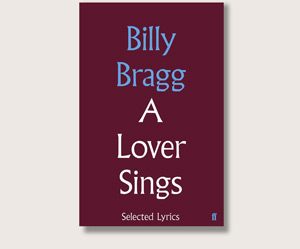 My all-time favourite Billy Bragg lyric ‘When the world falls apart some things stay in place’ is a pretty good starting point when things move, and change, with a degree of unpredictability. It’s a line from Billy’s Levi Stubbs Tears where Billy is accompanied by a superb trumpet solo from Dave Robinson. A Lover Sings contains the lyrics to this song, plus a host of others personally selected by Billy, for those of us of a certain age, and politics, they tell us the story of the past thirty years and in line after superb line provide us with a hope and a vision for the next thirty too.
My all-time favourite Billy Bragg lyric ‘When the world falls apart some things stay in place’ is a pretty good starting point when things move, and change, with a degree of unpredictability. It’s a line from Billy’s Levi Stubbs Tears where Billy is accompanied by a superb trumpet solo from Dave Robinson. A Lover Sings contains the lyrics to this song, plus a host of others personally selected by Billy, for those of us of a certain age, and politics, they tell us the story of the past thirty years and in line after superb line provide us with a hope and a vision for the next thirty too.
Looking back to find a way forward can trap us in a certain kind of conservatism.My next two choices for 2016 are a pair of books that challenge this in the way they address the past. Eric Hazan uses a single instrument of resistance and rebellion to produce a unique history of the processes of social change in A History of The Barricade. Kate Evans has produced a graphic biography Red Rosa to bring the life, times and ideas of Rosa Luxemburg alive in a vivid and striking manner text alone will never match for impact and engagement.
One of the more pleasant surprises of 2015 was the failure of UKiP to stage any kind of electoral breakthrough and in particular Farage not being elected an MP for the embarassingly umpteenth time. Though the former was principally down to the rotten electoral system we are lumbered with on the basis of the scale of the votes they did attract in coming second, third or fourth in constituency after constituency they certainly merit more than just the one MP, like it or not. Matthew Goodwin and Caitlin Milazzo meticulously map UKiP’s politics and appeal in their book UKiP : Inside the Campaign to Redraw the Map of British Politics essential reading ahead of the Euro Referendum in which UKiP will no doubt feature strongly. My prediction? SNP win overall majority in May Scottish Parliament Elections then campaigns successfully for yes vote in Scotland to stay in EU. England votes to leave. The Union is finished, UKiP reinvents itself as the English Independence Party leaving Tories hopelessly divided over whether to save the Union or exit the EU.
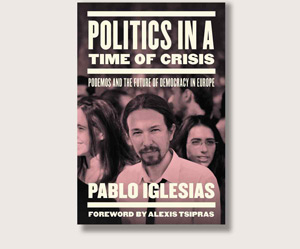 Syriza began the 2015 political year. Podemos more or less ended it. The latter is looking increasingly likely to be of the more lasting political significance. Not only by breaking Spain’s own version of the two-party duopoly but in transforming how politics is done. Podemos combine a politics of populism with a party culture of popular participation. Pablo Iglesias sets out the scale of his vision in Politics in a Time of Crisis, if Corbynite Labour is to mean anything it will need to conjure up something similar, to transform what was an increasingly moribund party into a social movement. The 2016 clock is already ticking on that one.
Syriza began the 2015 political year. Podemos more or less ended it. The latter is looking increasingly likely to be of the more lasting political significance. Not only by breaking Spain’s own version of the two-party duopoly but in transforming how politics is done. Podemos combine a politics of populism with a party culture of popular participation. Pablo Iglesias sets out the scale of his vision in Politics in a Time of Crisis, if Corbynite Labour is to mean anything it will need to conjure up something similar, to transform what was an increasingly moribund party into a social movement. The 2016 clock is already ticking on that one.
The era of the protest song began in 2015 to show some signs of a return, a subject I will return to in a future, musical, review. But for now most signs of a revolution in sound remain firmly located in a more distant past. It is a subject the author Jon Savage is superbly well-equipped to address as he proves in his splendid new book 1966 : The Year the Decade Exploded which details twelve months of CND, Vietnam, Warhol , Motown and The Beatles.
One of the characteristics of the musical movements that Jon Savage records was their global appeal, and this all pre Web 2.0. English culture remains despite the revolution in information technology naturally inward-looking. The project of the always brilliant Pushkin Press via the translation of the very best in modern European Literature for an Anglo –audience. My pick of their bunch from 2015 isthe Spanish writer Iván Repila’s allegorical novel The Boy Who Stole Attila’s Horse. Human desperation vs the necessity of hope, told via fairytale, this is big picture writing at it’s most imaginative and unpredictable.
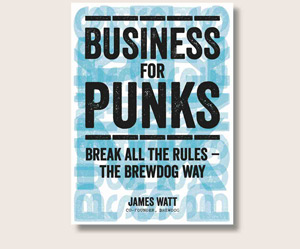 A business book may appear at first sight a strange choice to include in my top ten for 2016 political books but then as a co-founder of self-styled ‘sportingoutfitters of intellectual distinction’ I’ve found on more than a few occasions such texts provide just the kind of organisational acumen conventional politics so sorely lacks. And my choice is no ordinary business book either, cult beer label James Watt’s Business for Punks. Whether or not you are part of that happy band who combine commercial ambition with political principle this is a hugely educational book on how to get organised for change. Real ale was for a period in the 1980s one way to define a counter-culture, today the same can be said of craft beer. This is the book to read and find out why.
A business book may appear at first sight a strange choice to include in my top ten for 2016 political books but then as a co-founder of self-styled ‘sportingoutfitters of intellectual distinction’ I’ve found on more than a few occasions such texts provide just the kind of organisational acumen conventional politics so sorely lacks. And my choice is no ordinary business book either, cult beer label James Watt’s Business for Punks. Whether or not you are part of that happy band who combine commercial ambition with political principle this is a hugely educational book on how to get organised for change. Real ale was for a period in the 1980s one way to define a counter-culture, today the same can be said of craft beer. This is the book to read and find out why.
Alongside craft beer all things culinary in 2015 continued to dominate the terrain of popular culture. It’s a space where the political is typically absent yet absolutely necessary. This has become a kind of peculiar obsession of mine, why doesn’t the Left take what it eats more seriously when a huge chunk of the population seems absolutely transfixed by the subject. What if this was to change in 2016? For a textbook version of the creativity of utilitarian cooking look no further than the latest in Leon's series of cookery books Leon : Family & Friends by Kay Plunkett-Hogge and John Vincent.
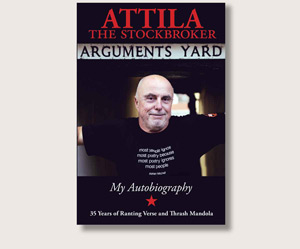 My number one choice of book to read in 2016 effortlessly mixes politics, punk, poetry, football and beer and it is because he makes that combination so much fun that Attila the Stockbroker’s autobiography Arguments Yard is such a compelling story. Those who trample the past in their headlong rush to find the new won’t give such a book more than a second glance, writing off the 35 years Attila has spent helping to establish a radical culture of live poetry and ranting rebellion. That will be their loss, don’t let it be ours. A book to read, a mission to sign up for, a practice to learn from. A truly wonderful piece of writing, thanks Attila.
My number one choice of book to read in 2016 effortlessly mixes politics, punk, poetry, football and beer and it is because he makes that combination so much fun that Attila the Stockbroker’s autobiography Arguments Yard is such a compelling story. Those who trample the past in their headlong rush to find the new won’t give such a book more than a second glance, writing off the 35 years Attila has spent helping to establish a radical culture of live poetry and ranting rebellion. That will be their loss, don’t let it be ours. A book to read, a mission to sign up for, a practice to learn from. A truly wonderful piece of writing, thanks Attila.
Note : No links in this review are to Amazon, if you can avoid buying from the tax-dodgers please do
Mark Perryman is the co-founder of the self-styled ‘sporting outfitters of intellectual distinction’ aka Philosophy Football. His new new book 1966 and Not All That is published in May.
YES THEY CAN: The Meaning of Podemos
15.01.2016
Sanjiv Sachdev reports for Philosophy Football on a recent seminar about the meaning and significance of Podemos
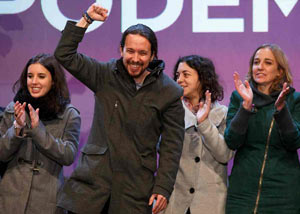 In December’s Spanish General Election, Podemos (‘We Can’ in English), led by the charismatic Pablo Iglesias, emerged as the only clear cut winner. It did much better than the polls had predicted, securing 69 of the 350 seats in parliament (the Conservative Partido Popular won 123, the Socialist PSOE 90). Its share of the vote was just below that of the Socialists (21 per cent versus 22) - a remarkable achievement for a party that only formed in January 2014. Sociologist Carlos Delclos is based in Barcelona, at the seminar he explained Podemos has gone, in two years, from fifty people protesting in a plaza to 69 seats in parliament.
In December’s Spanish General Election, Podemos (‘We Can’ in English), led by the charismatic Pablo Iglesias, emerged as the only clear cut winner. It did much better than the polls had predicted, securing 69 of the 350 seats in parliament (the Conservative Partido Popular won 123, the Socialist PSOE 90). Its share of the vote was just below that of the Socialists (21 per cent versus 22) - a remarkable achievement for a party that only formed in January 2014. Sociologist Carlos Delclos is based in Barcelona, at the seminar he explained Podemos has gone, in two years, from fifty people protesting in a plaza to 69 seats in parliament.
Like Syriza, Podemos has given organisational form to a new European left-wing populism (what it calls ‘la nueva politica’). The PSOE has been seriously damaged by its role in implementing cuts and by corruption scandals. There has been a dramatic reconfiguration of Spanish politics, which remains in a state of febrile flux.
Podemos defines itself as a party, an electoral machine and a movement. Paul Kennedy, an academic specialising in modern Spanish politics joined the discussion to identify the roots of Podemos. Agreeing with Carlos he located these in the huge 2011 Indignados protests against Spain’s political system in the wake of financial crisis of 2008. The crisis left a quarter of Spanish families living below the poverty line; 400,000 families were evicted over the next few years while three million home lay empty. Unemployment rose above 26 per cent and above 60 per cent for the young. Deep cuts have been made to public spending and public sector jobs and it has been made much easier to sack workers. Moreover, corruption scandals have scarred political debate (even the Monarchy has fallen foul of this in the courts). Podemos emerged to challenge what it calls ‘la casta’ – the political and business elites (political recall is key demand of the party).
Key actors of Podemos came from a group of politics lecturers at Madrid’s Complutense University – including Iglesias - who sought to channel the energy of the Indignados, devising a strategy based on people versus ‘la casta’. Starting with an amateur TV discussion programme, ‘La Tuerka’ (and later ‘Fort Apache’), it built up a substantial on line presence, seeking to challenge and change conventional political debate and reach new audiences. Podemos sought to go beyond class to wider appeals embodied in the slogan: ‘We are neither left nor right. We are the people of the bottom going for people at the top’. The desire to win elections – and the realpolitik required to this end, has also been a key component of its approach.
Strategic alliances with Basque, Catalan and Galician nationalists also contributed to its success, going into the election as four groups (a outstanding issue is whether they will remain as four groups in the new parliament) but the issue of Catalan independence is potentially difficult one for Podemos (it supports a referendum on independence but opposes independence) and a potential stumbling block to forming a non-PP government.
Developing Gramsican concepts, the writings of Ernesto Laclau and Chantal Mouffe are hugely influential in Podemos thinking. The ideas of hegemony, sovereignty, multitude, radical democracy (the desire for ‘real democracy’ was a key component of the Indignados critique) and populism are widely used. The notion that identities are constructed and not an objective reality is a cornerstone of their thought.
It is a politics of emancipation, with a focus on a broader, more inclusive category of ‘people’ rather than ‘class’ as a category of emancipation. New concepts such as ‘revolving door’, the ‘Berlusconisation' of politics, the 'Bunker' (to describe the two main parties), have been deftly deployed by Podemos to shift the terms of political debate.
‘Radical democracy’ includes challenging supra-national notions of power that do not benefit democracy. Spanish sovereignty is seen as having been usurped by the forces of global capital (represented by the Troika) with cooperation of the country’s elites. Sirio Canos from Podemos GB and recent speaker at Philosophy Football’s ‘Scroogeonomics’ event cited at the seminar as an example the constitutional change enacted in 2011 by the PSOE and PP that made it a legal requirement for Spain’s governing party to designate balancing the budget a priority over public spending and investment. Reclaiming sovereignty is now a key objective for Podemos.
Spanish politics has a history of institutional experiment. Podemos began as an innovative blend of social media and grassroots politics. Internal democracy has been one of the key innovations of Podemos – although its scope and success is both debated and contested. The party has set up assembly-style ‘circulos’ or circles, a network of groups convened online or in person, defined either by geography or by area of interest or identity (science, sport, LBGT etc) to inform debate and policy development – one of the panel contended that most of the circles have become zeros, being mostly discarded in day-to-day practice (some prominent exceptions – such as sectional and international circles - were also identified).
Digital technology has also been enthusiastically embraced and adroitly used as a means of campaigning and internal democracy, but so have conventional media such as television (one critic dubbed Podemos as ‘A Leninist media project’). An App has been devised to enable voting.
The political discourse in Spain has traditionally been very pro-European (this included the once influential Communist party). The economic and political benefits of EU membership are widely accepted. The actions of the Troika in Greece has tempered this enthusiasm, but Podemos remains broadly pro-European, arguing for a different type of Europe, not underpinned by neo-liberal norms. Moreover, Spain’s economic situation is different to that of Greece, in that its economic plight is not as grave and it is more central to the European economy than Greece.
The key conclusion of the seminar was that Podemos has opened a new political space, changing the political terms of debate in key areas – in the words of one of their slogans: ‘making what appears impossible, possible’. And the relevance outside Spain was startlingly obvious for the British Left too, issues such as the challenges represented by the bond market, winning amid a hostile media, maintaining and enhancing internal democracy, accommodating regional calls for greater autonomy or independence are salient for the UK as well as Spain.
Further reading: Pablo Iglesias Politics in a Time of Crisis: Podemos and the Future of Democracy in Europe, published by Verso
Top Ten Sports Books to Read in 2016
03.12.2016
Mark Perryman ofPhilosophy Football picks his favourite reads for the new sporting year
Football’s European Championships featuring England, Wales, Northern Ireland and the Republic, the Rio OIympics, the Fury vs Klitschko rematch and the Ryder Cup will undoubtedly dominate the 2016 sporting summer and autumn, while cycling’s World Track Cycling Championships coming to London in March will be a domestic highlight. But then every year has its customary roster of the Six Nations, Grand National and Epsom Derby, Wimbledon fortnight, Le Tour, Formula One’s Grand Prix circuit and the weekly soap opera that modern football has increasingly become. Love it, like it, loathe it, ignore it or hate it, sport is inescapable. Its enduring appeal for the enthusiasts is located in the unpredicatability of outcomes, and long may that remain in 2016.
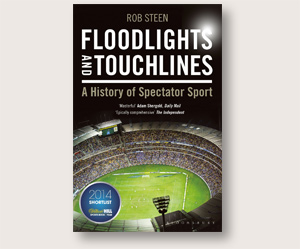 How to explain the social and cultural emergence of spectator sport as the pre-eminent global community it has become? The best single volume chronicle of its dominance is provided by Rob Steen’s quite extraordinary Floodlights and Touchlines, reissued in 2015 as a handy paperback edition.
How to explain the social and cultural emergence of spectator sport as the pre-eminent global community it has become? The best single volume chronicle of its dominance is provided by Rob Steen’s quite extraordinary Floodlights and Touchlines, reissued in 2015 as a handy paperback edition.
The Heyday of the Football Annual, compiled and written by Ian Preece and Doug Cheeseman, takes the reader back to an age when football wasn’t all things to all men (and some women) and more like simply a sport. The mix of illustrations and text captures wonderfully the process of change, mostly for the worst, in England, home of the Premier League monster, at least. For the superlatives in modern football we have to look to Germany. World Champions, cheap match tickets, no foreign-owned clubs, safe standing and drinking while you watch a game, what’s not to like? Das Reboot is Raphael Honigstein’s highly readable account of the national team’s recovery from the relative lows of early exits at World Cup ’98, Euro 2000 and Euro 2004 to reigning World Champions.
Few other sports can match cricket for the quality of writing it has inspired. There is something about a five-day test, complete with lengthy breaks for lunch and tea, the crucial role of the toss of a coin to choose who bats or bowls first , and of course the ever-present threat or saving grace of ‘rain stopped play’ that creates a sporting drama, and literature, quite unlike any other. Charlie Connelly’s fictionalised account Gilbert: The Last Years of WG Grace is a splendid addition to the genre, as he tells his own imaginary story of WG’s twilight innings. Witty, appreciative of the sport’s history, and highly original.
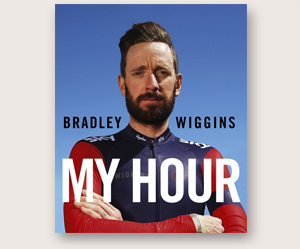 2012’s ‘Wiggomania’ was British cycling’s breakthrough moment and it has hardly looked back since. Bradley Wiggins is not only an incredibly gifted cyclist, but is also steeped in the traditions of cycling. His 2015 hour record as described in his new book My Hour was thus not only a world record but a tribute to all those who had gone before him to beat the clock. This beautifully produced book records in words and pictures the significance of both those ambitions. Neither Wiggins nor ‘the hour’ came out of nowhere. A much needed semi-social history of British cycling has finally been written and very good it is too. Kings of the Road by Robert Dineen records the sport’s early beginnings, the characters and events which framed its growth, and the most recent period of sparkling success and popularity.
2012’s ‘Wiggomania’ was British cycling’s breakthrough moment and it has hardly looked back since. Bradley Wiggins is not only an incredibly gifted cyclist, but is also steeped in the traditions of cycling. His 2015 hour record as described in his new book My Hour was thus not only a world record but a tribute to all those who had gone before him to beat the clock. This beautifully produced book records in words and pictures the significance of both those ambitions. Neither Wiggins nor ‘the hour’ came out of nowhere. A much needed semi-social history of British cycling has finally been written and very good it is too. Kings of the Road by Robert Dineen records the sport’s early beginnings, the characters and events which framed its growth, and the most recent period of sparkling success and popularity.
The recent Tyson Fury furore (sic) has reignited debates around the brutalised version of masculinity that boxing invariably frames. Though when this becomes immersed in the hapless non-entity of the BBC Sports Personality of the Year award, the issue becomes merely trivialised. Where does it say in the programme notes that the nomination is for only the ‘good’ personality? Donald McCrae has produced perhaps the finest retort to the acres of useless newsprint commentary on the subject with his new book A Man’s World telling the otherwise untold story of Emile Griffith, black World Welterweight boxing champion and gay man.
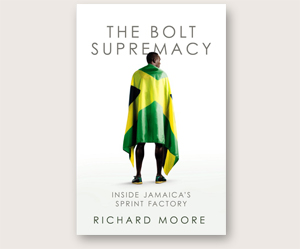 There was a period when World Heavyweight boxing champions – Ali, Frazier, Foreman, Tyson – were indisputably the most famous sports stars on the planet. Nowadays sporting culture is more diverse, fragmented and niched, so it isn’t so easy to nominate who would claim that mantle in 2016. The strongest contender however would surely be Usain Bolt. Richard Moore has written a string of superbly revelatory sports books, his latest The Bolt Supremacy investigates not only Bolt’s rise to become the world’s most famous sportsman, but also the athletics culture of Jamaica that produced him. A superb read ahead of Rio 2016.
There was a period when World Heavyweight boxing champions – Ali, Frazier, Foreman, Tyson – were indisputably the most famous sports stars on the planet. Nowadays sporting culture is more diverse, fragmented and niched, so it isn’t so easy to nominate who would claim that mantle in 2016. The strongest contender however would surely be Usain Bolt. Richard Moore has written a string of superbly revelatory sports books, his latest The Bolt Supremacy investigates not only Bolt’s rise to become the world’s most famous sportsman, but also the athletics culture of Jamaica that produced him. A superb read ahead of Rio 2016.
But the core appeal of sport is that it is, in principle at least, for everyone, not just the gold medal winners and world record-breakers. We can all take part. What we are embarking on when we cross that line from inactivity to activity is to engage with some kind of testing of our potential for endurance, strength or speed. Few however will ever reach the heights of ultra-runner Lizzy Hawker. Yet as she recalls in her book Runner there is an unbroken connection of experience and ambition between the novice jogger taking their first tentative steps on a New Year resolution run to get fit and her superlative achievement of running up and down mountains for 24-hours at a stretch.
 Which is how I ended up with my pick of the sports books to read in 2016. Hugh Hornby’s Bowled Over. The latest in the incredibly ambitious ‘Played in Britain’ publishing series, author Hugh Hornby explores a sport little known outside of its coterie of enthusiasts, bowling, yet absolutely woven into the fabric of English life . The history and changing culture of that connection tells us so much about both the intrinsic value of sport and the making of Englishness. A sport that barely features on the back pages, but with roots that rival, if not exceed, the money-fuelled TV extravaganza of football, rugby, cricket, formula one that fills the TV sporting schedules. Never mind the hype of the Premier League, Rio, Wimbledon and so on, Bowled Over is my number one book to help us understand the true meaning of sport in 2016.
Which is how I ended up with my pick of the sports books to read in 2016. Hugh Hornby’s Bowled Over. The latest in the incredibly ambitious ‘Played in Britain’ publishing series, author Hugh Hornby explores a sport little known outside of its coterie of enthusiasts, bowling, yet absolutely woven into the fabric of English life . The history and changing culture of that connection tells us so much about both the intrinsic value of sport and the making of Englishness. A sport that barely features on the back pages, but with roots that rival, if not exceed, the money-fuelled TV extravaganza of football, rugby, cricket, formula one that fills the TV sporting schedules. Never mind the hype of the Premier League, Rio, Wimbledon and so on, Bowled Over is my number one book to help us understand the true meaning of sport in 2016.
Note: No links in this review are to Amazon, if you can avoid purchasing from tax-dodgers please do so.
Mark Perryman is the co-founder of the self-styled ‘sporting outfitters of intellectual distinction’ akaPhilosophy Football. His book1966 and Not All That is published May 2016.
Scroogeonomics 2015
24.12.2015
A mean-spirited employer exploiting a low-wage economy to his own ends while undermining the human solidarity of families and communities. Charles Dickens' A Christmas Carol of 1843 sounds all too familiar on Christmas Eve 2015.
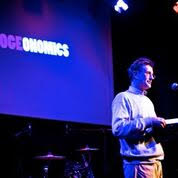 David Boyle , author of the excellent book How to Be English explains the enduring relevance of Scrooge.
David Boyle , author of the excellent book How to Be English explains the enduring relevance of Scrooge.
"The phrase “bah! humbug!” has long since passed into the English language, as a symbol of the mercantile approach to Christmas. It did so six days before Christmas in 1843, when Dickens published A Christmas Carol, at his own expense and single-handedly reinvented an English Christmas – with roast Turkey, families, presents, bonhomie and a very English kind of over-indulgence.
The title of Dickens’ book was deliberately chosen. It made the story sound mythic, ageless and reached back to the days when the English sang Christmas carols – and hastened the day when they would sing them again. But then, this may not have been Dickens’ main intention when he wrote the book, though he carried on writing annual Christmas stories until 1849, when he was too busy with writing the great slab of David Copperfield to have time. His main intention was to extract a little generosity of spirit from the English in their most mercantile of moods.
And if we ever doubt that change is possible, a quick re-read of A Christmas Carol can reassure us. There never was a transformation quite so instant as Scrooge’s, but Dickens takes him through a process which makes it possible for us to have the same experience, part memory, part shame, part exorcism. As it is, he seems to have succeeded in resurrecting Merrie England from the bare, dry bones of utilitarianism and as such deserves the last place in this book – in the hope that someone might repeat the trick again some day soon."
Danny Dorling is one of the country's leading experts on inequality. Philosophy Football commissioned Danny to provide an explanation of Scrooge 2015. Danny's text is combined with cartoons by Ella Furness, and music we also commissioned from Nia in a short film produced by Simon Green of Eventful. Danny explaines the causes and consequences of inequality and how, despite the intervening 172 years since A Christmas Carolwas published, because of low wages, rising personal debt - especially student debt - and lack of affordable housing, 2015 remains positively Dickensian for many.
For a small company Philosophy Football has big ambitions. When we set out on the idea of linking Christmas 2015 to Dickens' Scrooge of 1843 we not only commisioned music and ideas plus David Boyle's reading of his explanation of A Christmas Carol but also a poem by Matt Abbott.
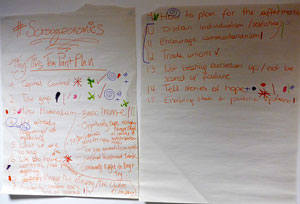
And in search of alternatives to Scroogenomics, Philosophy Football organised a seminar for a group of our customers and friends with Andrew Simms of the New Weather Institute who brought along a panel featuring the architect of 'Corbynomics', tax justice campaigner Richard Murphy, one of Jeremy Corbyn's economic advisers Ann Pettifor, and co-author of The New Materialism Ruth Potts. From their afternoon of duscussion they devised this 10-point alternative to Scroogeonomics.
- Capital Controls: the right wing in Britain campaign against membership of the European Union by appealing to fears over sovereignty and yet, ironically, they support a far greater threat to economic autonomy: unconstrained capital mobility. Step one in replacing Scroogeonomics is the ability to make finance a servant to the useful economy and not its master, subject to democratic checks and balances.
- Tackle the Tax Gap: the Government should publish and tackle the multi-billion tax gap – the difference between what companies and their wealthy owners should be paying and actually are. What’s missing is the glue that binds society together and pays for it’s needs and ambitions.
- Replace wasteful, unsatisfying and debt-fueled consumerism with a healthy relationship to the material world: good work in a green, circular economy in which we care for, share and repair goods can create a ‘new materialism’ that helps everyone have what they need and flourish within planetary boundaries.
- Better Economic Alternatives Already Exist: from banking to tax, investment, food, transport and energy the world is full of better policies. There are unsung stories of hope from communities producing their own renewable energy, creating their own currencies, growing their own food, running their own budgets and making the transition to a fair, zero carbon economy.
- Speak Up About What is Being Lost: from libraries to essential services and the arts, counterproductive austerity policies are destroying many of the things that makes life good and society hold together. Austerity creates a domino effect of lost income, it is not prudent
- We Have the Power to Change Things: a chaos economy is not inevitable, but a political choice made by those who simply don’t believe the mess should be managed and who, by-and-large, are wealthy enough to avoid the pain when things go wrong. We can choose to manage the chaos, rather than have the chaos manage us.
- There Will Be Another Crash: this time there is no excuse not to see it coming. We should plan now for what to do after in the inevitable state of flux, asking what sort of society we want and what kind of economy can support it. More than learning from the past so as not to repeat it, like there was for Scrooge himself, there will be a chance for a new beginning.
- We Are Better Together: our human ability to cooperate could be our greatest distinguishing feature among other animals, explaining our success as species. Culturally and economically we are interdependent yet economic policy promotes selfish individualism. Even the International Monetary Fund believes collective action through trade unions is vital for economic flourishing. The policy pendulum swung too far towards atomised individualism and must find a better, more communal balance.
- Do Not Fear Failure: building a better economy is not easy, those who try shouldn’t beat themselves up if things don’t always work because the forces aligned against progressive change are large.
- The Public Sphere Needs Re-asserting: from the neighbourhood to all our public goods, it is there to catch things when they fail – as it did, thanklessly, for the banking sector in 2007-2008 – and to make life better for all. Yet, through an ideological infatuation with private finance and interests, the Scroogeonomics of an overconfident establishment is undermining itself and the very public sphere that markets, and all of us, ultimately rely on
All for Christmas Eve 2015. 'We don't sell T-shirt' has always been, and remains, our proud boast. T-shirts as a platform for ideas and ideals. Creating sparks of creative collaboration through music, poetry, film and ideas. Enjoy the season and here's to a more peaceful new Year than the last one.
For one night only Philosophy Football Christmas Party feat Bridget Christie
08.12.2015
For One Night Only! The Philosophy Football Christmas Party with Bridget Christie vs Scrooge
The season of not much peace and precious little goodwill also provides us with a radical counter-narrative to the consumerist bonanza that Christmas has become. What Christmas would be complete without Dickens’ A Christmas Carol? And who is the villain of the piece? A mean-spirited employer whose name has become synonymous with all that is rotten in a low-wage economy clampdown.
 So the celebrated organisers of a good night out, aka Philosophy Football, have teamed up with the Peoples Assembly and the RMT supported by the FBU for a huge Scroogeonomics Christmas Party on Saturday 19 December at east London arts venue Rich Mix.
So the celebrated organisers of a good night out, aka Philosophy Football, have teamed up with the Peoples Assembly and the RMT supported by the FBU for a huge Scroogeonomics Christmas Party on Saturday 19 December at east London arts venue Rich Mix. A seasonal Saturday night out with a headlining stand-up set of razor-sharp wit from Bridget Christie, preceded by an in-conversation with Guardian columnist Zoe Williams. Plus sparkling spoken word from poet Salena Godden.
Closing the show originators of socialist r'n’b Thee Faction will be playing anthems to dance, or march to, with South Coast Ska legends The Meow Meows in hot musical pursuit. If that lot doesn't get our audience laughing and dancing then some ghostly Christmas spirits will have to be called upon to sort out a sense of humour and some dancing shoes for Santa to pack when he makes it down the chimney.
The night won’t be short of ideas either. Opened by the renowned writer on inequality, Danny Dorling, an international discussion on austerity and its discontents with Marina Prentoulis of Syriza with NUS vice-president Shelly Asquith, Fire Brigades Union General Secretary Matt Wrack and RMT Senior Assistant General Secretary Steve Hedley.
Conscious of the enduring popularity of A Christmas Carol and its essentially radical narrative, new work has been commisioned by artists keenly involved in the anti-austerity movement, to reinterpret the story as a tale of their generation. Photographer Jess Hurd, poet Matt Abbott and musician Nia will be launching this work on the evening.
Saturday 19 December, doors open 6.00pm, show starts 7.00pm at the superb Rich Mix Arts Venue in east London. Tickets just £9.99, with discounts on group tickets. From Philosophy Football Or call 01273 472721 to book .
Christmas Appeal Football Scarves for Refugees
01.12.2015
 The first Spanish player in the English league? A Basque refugee from the Spanish Civil War. Scorer of Blackpool’s fourth and final goal in the ‘Matthews Cup Final’? A refugee from the racist South African regime. What have Puskas and Zlatan Ibrahimovic got in common? Clue - Ferenc never sported a ponytail. From which Balkan conflicts had members of the Swiss Squad who faced England during the Euro 2016 qualifiers escaped?
The first Spanish player in the English league? A Basque refugee from the Spanish Civil War. Scorer of Blackpool’s fourth and final goal in the ‘Matthews Cup Final’? A refugee from the racist South African regime. What have Puskas and Zlatan Ibrahimovic got in common? Clue - Ferenc never sported a ponytail. From which Balkan conflicts had members of the Swiss Squad who faced England during the Euro 2016 qualifiers escaped?
Sometimes pub quiz questions have a knack of revealing hidden histories to explain not only the past but the present too. ‘The Football Family’ is an establishment term in football, devoid of almost any meaning or purpose. GuardianColumnist Marina Hydehas pointed out the refugee crisis is a time when the phrase could, and should, acquire some much-needed meaning, saying ‘If such a thing can ever be said to exist, then this issue gripping Europe should be among the very closest to its heart.’ And so Marina’s words inspired Philosophy Football to launch one fans initiative to do precisely that.
'Refugees are our football family' was launched by Philosophy Football with the backing of the Football Supporters Federation, Football Action Network, Football Against Racism in Europe, Football Beyond Borders, Kick it Out, the Hope not Hate campaign and the fanzine When Saturday Comes. Philosophy Football designer Hugh Tisdale produced a fundraising T-shirt . Hugh explains ‘The united club colours symbolise football as 'us', not 'me', thats the game at its best a community of localities and nations together.’ With all profits going to Doctors of the World UK who staff the only medical clinic operating in the Calais Refugee Camp and who operate other clinics in refugee camps across the Middle East, North Africa and Europe. In just seven days £1000 had been raised. Mark Perryman, with Hugh Philosopohy Football's co-founder, describes the ambition’ Our aim was to raise a lot of money and quickly, going directly to where the help is needed most backed by hundreds, thousands, of fans wearing the message that ours is a football culture that is open, welcoming with a human generosity of spirit.'
Raising funds was the principle focus accompanied by a symbolic solidarity. As winter approaches, conditions in the camps will worsen. Fans from every club across Britain and beyond were asked to send in old club scarves. Hundreds arrived, shipped to the Calais Refugee camp from a local aid distribition pick up we liaised with in Bury St Edmunds via Calais Action. With thousands more generously donated by both Aston Villa and Arsenal football clubs, these are being transported for us by container to some of the most precarious refugee camps on the Greek Islands by the charity Woollens. They are on the list of goods the Refugee charities most need and fans helped out with lorryloads of scarves taken to the camp by the charity SKT Welfare. Mark calls these efforts a journey of hope ‘from one home of football a powerful symbol of the kind of humanitarian hospitality all fans can be proud of.'
And now, with the coldest months of the year approaching, Philosophy Football have issued a Christmas Football Scarves Appeal appealing once again for more scarves to help refugees, often in unheated accommodation, to have a better Christmas than they might do so otherwise.
Send clean, good condition club scarves to Philosophy Football, PO Box 11140, Harwich CO12 9AP.
Paris, Wembley and a Night of Solidarité
23.11.2015
Philosophy Football's Mark Perryman and Hugh Tisdale describe the night St George was replaced by Le Tricolour
Since ’98 at every England home game Philosopohy Football has organised a group of fans, under the banner ‘Raise the Flag', who lay out thousands of cards to form a huge St George Cross, a fans’ flag.
Not on Tuesday night we didn’t, against France.The FA get a lot of stick but on this occasion they took a magnificent lead. As soon as the French announced they wanted the game to go ahead the FA turned Wembley into a celebration of solidarité and humanité. The stadium bathed in the bleu, blanc et rouge not of a Union Jack but Le Tricolour. Sponsors' logos and pitchside advertising replaced by three words. Liberté, Égalité, Fraternité. Much-needed leadership from above. But none of this would be worth very much without support from below. The fans busy practicing La Marsellaise on the tube to the game, those who’d hunted out an old French shirt to wear, daubed a message on a tricolour, symbolised by the thousands of fans holding up the cards the cards we'd laid out to form their flag, not ours and with hardly a murmur of dissent.

Hugh Tisdale, co-founder of Philosophy Football and designer of these 'Raise the Flag' effects describes Tuesday night as 'a very effective event, its poignancy extremely moving, its coincidental closeness to the Paris attacks extraordinary, but the elements of direct crowd participation were crucial the singing of the French national anthem, the dignified minute's silence, and the giant mosaic of the French tricolour - a huge visual statement of solidarity which emerged from 8,000 football fans for just for a minute or more, before fading away back into the crowd. A great, brief, collective, work of art, generously given to the spectacle by anonymous individuals. "
This was a participative, visual, inclusive politics, with an eye on maximum media exposure. Not a public meeting, a rally, a vigil, these were ordinary men and women, kids with mums and dads, at a game they had been looking forward to, watching a sport they love appreciating something bigger than the fact that the bombs had killed their lot, not ours. It could just as easily have been us.
This is what a hegemonic politics looks like. Starting where people are at not where we might want them to be. Too much of politics consists of a language only capable of understanding by the already-committed, bolstered by a cult of activism that is entirely alien to most people. Politics should be a journey of beginnings not final destinations.
Tuesday night was a supreme moment of popular internationalism. Caring about, singing the anthem of, waving the flag that belongs to, an other. Football, the biggest single popular cultural form in England, is also entirely Europeanised. The single Europpean currency a coin? Don’t make us laugh, it’s a game of twenty-two trying to put a ball between two uprights and a crossbar. What hope do we have with an in/out EU referendum when for these so-called activists this has never even occurred to them. Philosophy Football has always recognised this from our very beginnings with Euro '96, with a shirt that celebrated football as a common language via a design illustrated by a fussball, voetbal, le foot, fitba and every other language of the participating nations' teams. And we have done the same via soft patriotism, one that is for all, around the England team too.
Yes there are contradictions. Liberté, Égalité, Fraternitéthe founding ideals of the French Revolution and the French republic, with the wreath-laying led by Prince William. La Marsellaise a rebel song, once described by comedian Rob Newman as “like having The Clash’s ‘Guns of Brixton’ as your National Anthem” vs “Long to Reign Over Us, Happy and Glorious.” A multicultural French team on the pitch. Off the pitch the Front National on the march.
 But life is full of contradictions, this is politics. A hegemonic politics pushes at the limits of the contradictions, taking them as the start of a conversation, not a reason to close it down. The sociologist Stuart Hall once wrote of the importance of popular culture as a space where ideas are formed and changed, "the cultural dimension seemed to us not a secondary, but a constitutive dimension of society." That's why Wembley's night of solidaritéwas so important, so effective and we were proud to play our part in helping to make it happen because we absolutely believe in the cultural dimension, especially at the popular level, as a spsce where change happens. We were inspired originally, after all, by the words of Albert Camus, "All that I know most surely about morality and obligations I owe to football." For Philosophy Football, that's not a marketing slogan, it's our credo.
But life is full of contradictions, this is politics. A hegemonic politics pushes at the limits of the contradictions, taking them as the start of a conversation, not a reason to close it down. The sociologist Stuart Hall once wrote of the importance of popular culture as a space where ideas are formed and changed, "the cultural dimension seemed to us not a secondary, but a constitutive dimension of society." That's why Wembley's night of solidaritéwas so important, so effective and we were proud to play our part in helping to make it happen because we absolutely believe in the cultural dimension, especially at the popular level, as a spsce where change happens. We were inspired originally, after all, by the words of Albert Camus, "All that I know most surely about morality and obligations I owe to football." For Philosophy Football, that's not a marketing slogan, it's our credo.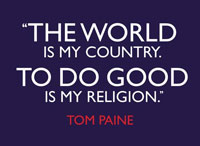 Half of Philosoophy Football is based in Lewes, where Tom Paine lived, worked and wrote. One of this country’s most famous writers, defender of the French revolution, put on trial for sedition in a British court, elected to the republican National Assembly in France. His most famous words are the means to shape humanitéout of horror. “The World is my country. To do Good is my religion.” After Paris these words are our beacon of hope, then and now.
Half of Philosoophy Football is based in Lewes, where Tom Paine lived, worked and wrote. One of this country’s most famous writers, defender of the French revolution, put on trial for sedition in a British court, elected to the republican National Assembly in France. His most famous words are the means to shape humanitéout of horror. “The World is my country. To do Good is my religion.” After Paris these words are our beacon of hope, then and now.- And then there were two
01.03.25 - This Land is (still) Your Land
22.02.25 - Happy 80th Birthday Bob Marley
01.02.25
